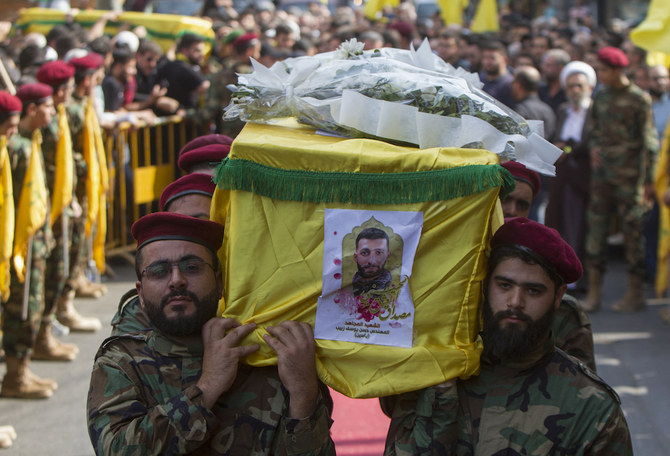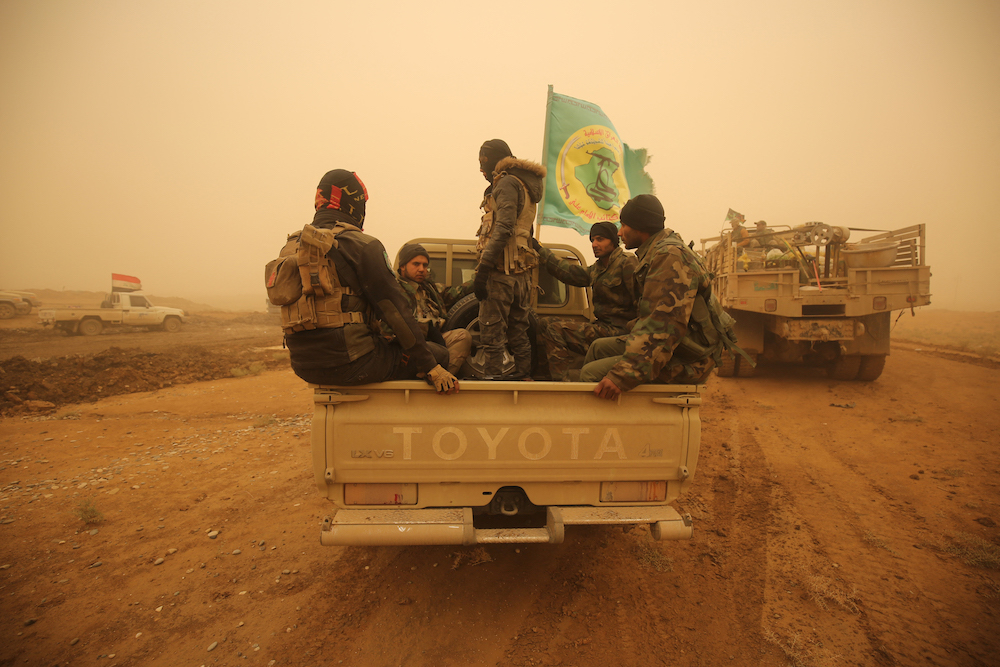WASHINGTON, D.C.: It was a late October morning in 1983 when two suicide trucks driven by members of a then little-known terror group named Hezbollah crashed into a US Marine Corps barracks in Beirut, killing 241 American and 58 French military personnel and six civilians.
Armed, funded and indoctrinated by Iran’s Islamic Revolutionary Guard Corps, Hezbollah was created to forge ahead with the Islamic Republic’s regional ambitions, expand its influence, and export its ideology.
In the years since the attack, Hezbollah has spread its tentacles into every aspect of social, economic and political life in Lebanon. Its influence and power have also spread abroad via a special unit known as the Islamic Jihad Organization.
More recently, Hezbollah has sent thousands of its fighters into Syria to help prop up the regime of Bashar Assad, where it is accused of ethnic cleansing and other war crimes against Syrian civilians.
In October 2019, when mass protests erupted against Lebanon’s ruling elite, Hezbollah militants attacked peaceful demonstrators. Similar scenes of violence played out in the streets of Beirut in October this year when Hezbollah militants clashed with unidentified gunmen.

Hezbollah is backed by Iranian-funded groups throughout the region, including Yemeni supporters of the terrorist Houthi militia (right), who have praised the Hezbollah leader Hassan Nasrallah. (AFP/File Photo)
Hezbollah supporters were protesting outside the Palace of Justice to demand the dismissal of the judge leading the independent criminal inquiry into the Aug. 4, 2020 Beirut port blast when they came under fire, sparking running street battles.
Given its suspected hand in previous terror attacks, Hezbollah could well have a connection to the massive cache of ammonium nitrate that caused the blast. Investigators want to question former government officials known to have close ties with the group — a prospect it views as a direct threat to its interests.
In most instances of Hezbollah violence, the Lebanese Armed Forces have either stood idly by or were simply no match for the group’s heavily armed and well-trained militants.
With its formidable war arsenal, including hundreds of precision-guided munitions and thousands of short to medium-range ground-to-ground rockets, Hezbollah is by far the best-armed faction in Lebanon — and the most dangerous.
A recent UN secretary-general report on Hezbollah reiterated the long-standing call for the group’s disarmament, as enshrined by UN Security Council Resolution 1559.
“The maintenance by Hezbollah of a military arsenal outside of a legal framework and its involvement in the Syrian Arab Republic continued to be denounced by a number of voices in Lebanon, who consider those issues to be destabilizing factors in the country and ones that undermine democracy,” the report stated.
“Many Lebanese see the continued presence of such arms as an implicit threat that the weapons could be used within Lebanon for political reasons.”
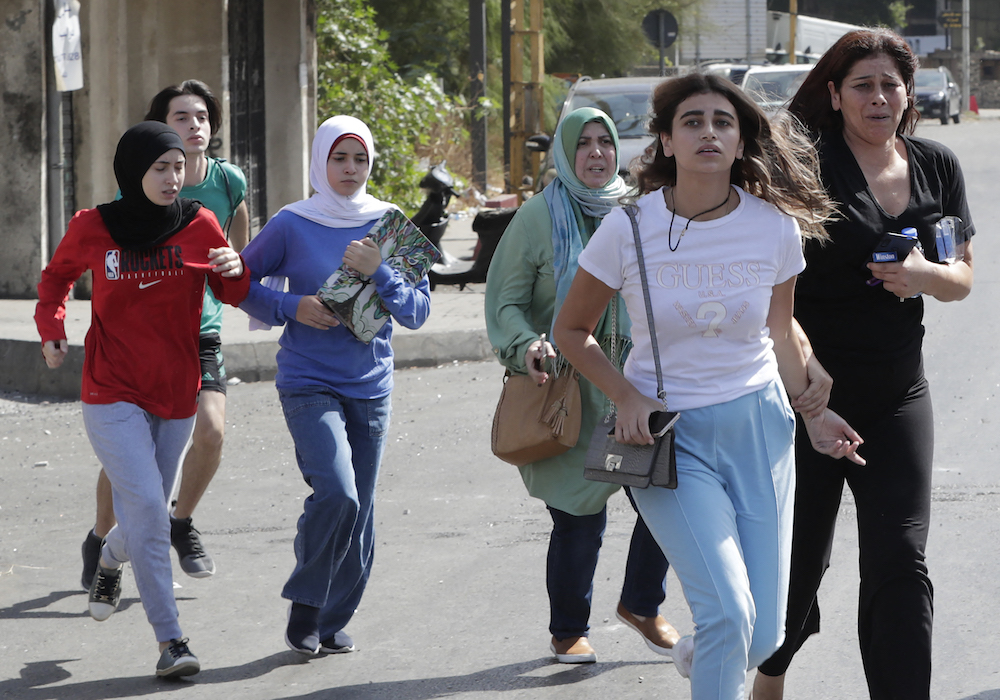
Civilians evacuate their homes during clashes in the area of Tayouneh, in the southern suburb of the capital Beirut on October 14, 2021, following a demonstration by supporters of Hezbollah and the Amal movements. (AFP/File Photo)
Those fears are well founded. In a recent speech, Hezbollah leader Hassan Nasrallah claimed to have amassed 100,000 fighters. In the same speech, he railed against the Beirut port blast inquiry.
Hezbollah’s creation of a “state within a state” is having a detrimental effect on Lebanon’s political economy and diplomatic standing, leaving the country impoverished and isolated. But experts are torn over whether the group can be disarmed, especially given Iran’s patronage and the West’s failure to establish a cohesive policy.
“Even though the UN has adopted resolutions requiring the disarmament of Hezbollah, none of the instruments, into which the US, primarily, has sunk billions of dollars of taxpayer money, were ever going to disarm the group. By that I mean the LAF and the UN Interim Force in Lebanon,” Tony Badran, a Lebanese expert at the Foundation for the Defense of Democracies, told Arab News.
“The LAF would never act against Hezbollah, regardless of how much the US builds its ‘capacity’ and ‘professionalism.’ These are irrelevant issues, as the problem is one of political order.
“For example, Hezbollah is the government. The LAF answers to the government. No government, even one in which Hezbollah does not sit, will approve action against the group. That’s a structural feature of the Lebanese system. It will not change regardless of how many billions the US throws at it.”
Indeed, analysts point to the parasitic relationship Hezbollah has established within key military and financial institutions. The US Treasury Department recently sanctioned a former finance minister for granting the group access to the ministry and Lebanon’s financial sector.
FASTFACTS
* Hezbollah leader Hassan Nasrallah claims to have amassed 100,000 fighters, on top of the vast arsenal supplied by Iran.
* Beirut port blast investigators want to question politicians with ties to Hezbollah — a prospect the group views as a threat.
Defense experts believe a sizable amount of Western aid handed to the LAF actually ends up filling Hezbollah’s coffers. UNIFIL, the UN peacekeeping force stationed on the Lebanese-Israeli border, is also seen by these experts as simply strengthening Hezbollah’s hold on the country.
The second-best alternative to disarmament might be to simply disengage from Lebanon, cutting off all outside financial help, thus depriving Hezbollah of this source of revenue.
“The US is invested now in the stability of the Hezbollah-led order and status quo, in which the LAF functions as Hezbollah’s auxiliary force,” said Badran. “Similarly, the states that contribute troops to UNIFIL have every incentive to maintain the status quo and avoid any clash with Hezbollah.
“Consequently, far from being viable instruments for disarming Hezbollah, the LAF and UNIFIL provide cover and support for Hezbollah and its operations.
“Therefore, the only meaningful policy for the US is to stop funding both these forces. Saudi Arabia came to this realization a few years ago and decided to end funding for the LAF, having understood that Lebanon, that is the so-called state, is dominated entirely by Hezbollah.”
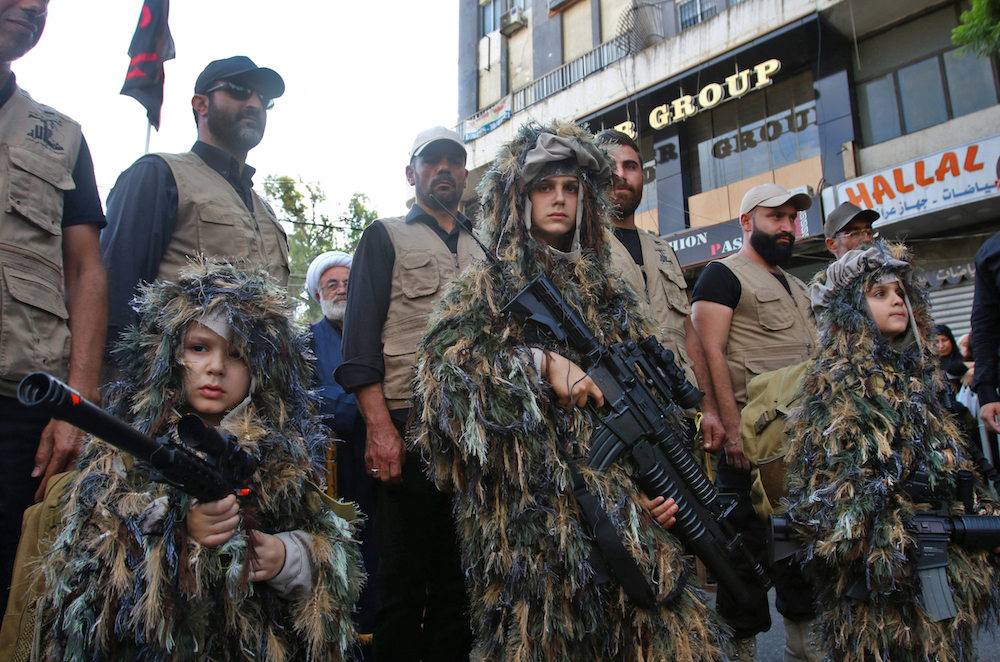
Boys wearing military fatigues carry weapons during a procession organised by Lebanon's Shiite Hezbollah movement following the mourning period of Ashura in the southern Lebanese city of Nabatieh. (AFP/File Photo)
To understand Hezbollah is to understand Iran’s regional strategy. The group has used its position to secure Iranian interests and territories, not only in the Levant but as far afield as Yemen.
As such, the Lebanese “state” has functioned as a bridgehead for regional destabilization, “not to mention narcotics trafficking and money laundering,” Badran said.
Hezbollah argues that its weapons arsenal and special role in Lebanon are necessary for resisting Israel. In reality, Hezbollah leverages its military supremacy and control over the internal security apparatus inside Lebanon to secure a financial windfall.
In May, the US government sanctioned Hezbollah’s financial firm Al-Qard Al-Hasan, which Saudi Arabia has also designated as a terrorist entity.
“From the highest levels of Hezbollah’s financial apparatus to working level individuals, Hezbollah continues to abuse the Lebanese financial sector and drain Lebanon’s financial resources at an already dire time,” the US Treasury Department said in a recent report.
“AQAH masquerades as a non-governmental organization under the cover of a Ministry of Interior-granted NGO license, providing services characteristic of a bank in support of Hezbollah while evading proper licensing and regulatory supervision.
“By hoarding hard currency that is desperately needed by the Lebanese economy, AQAH allows Hezbollah to build its own support base and compromise the stability of the Lebanese state.”
Kyle Orton, a British security analyst, does not believe that Hezbollah will disarm voluntarily as it is an extension of Iran’s long-term plans for the region and is thus more beholden to Tehran than to the interests of the Lebanese people.
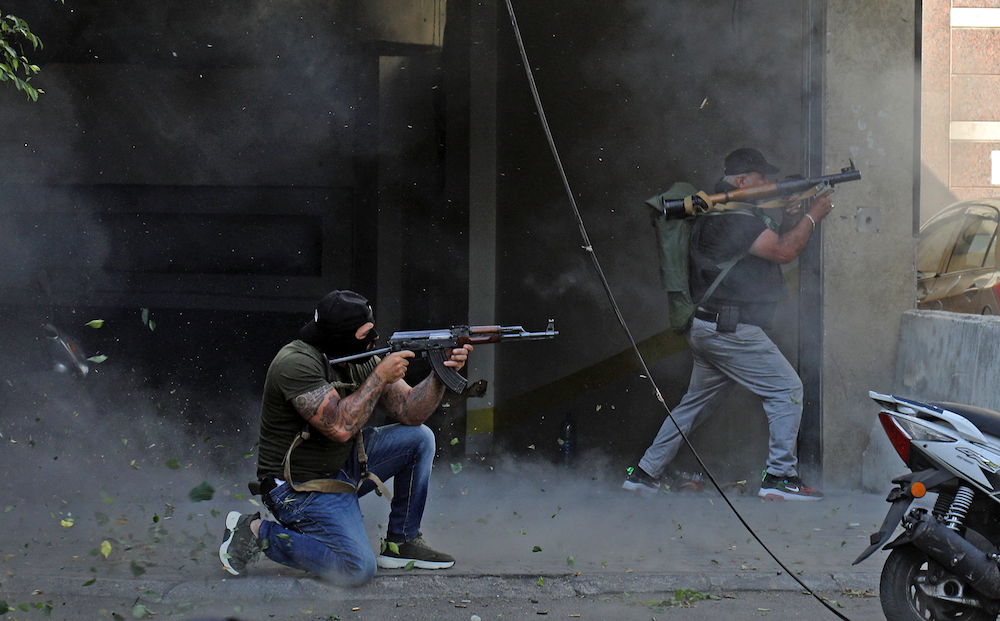
Shiite fighters from Hezbollah and Amal movements take aim with (L to R) a Kalashnikov assault rifle and a rocket-propelled grenade launcher amidst clashes in the area of Tayouneh, in the southern suburb of the capital Beirut. (AFP/File Photo)
“Hezbollah will obviously never lay down its weapons voluntarily and there is nobody who can compel them to, certainly not the UN,” Orton told Arab News.
“But really, the framing of the issue with Hezbollah as one of ‘disarming’ them somewhat misses the point. The problem is not Hezbollah’s weapons so much as its nature — a branch of the Islamic Revolution that seized Iran in 1979.
“Viewing Hezbollah as an integral component of the transnational Islamic Revolution explains why it behaves the way it does, as a gendarme and force-multiplier for the IRGC’s regional empire, and also suggests the only real solution to dealing with it is through removal of the Islamic Republic in Iran.
“Hezbollah is not a Lebanese creature, so trying to deal with it in a Lebanese framework — through disarmament mechanisms or whatever — is doomed to failure.”
Joseph Daher, a Lebanese analyst and author of “Hezbollah: The Political Economy of Lebanon’s Party of God,” says the group does still maintain a base of support within Lebanese society.
“The party still has a significant mobilization capacity within the Lebanese Shiite populations, although it has increasingly suffered criticisms within the community, including protests against the party and its members of parliament,” Daher told Arab News.
While the economic chaos, currency collapse and mounting global isolation are leading more Lebanese to outwardly voice their opposition to Hezbollah, the group has not hesitated to use brute force to stifle dissent.
Disarming Hezbollah may seem like a tall order. However, Lebanese across the sectarian spectrum still have to confront a difficult question: Can Lebanon survive as a sovereign state while Hezbollah continues to undermine it with impunity?
---------------
Twitter: @OS26


